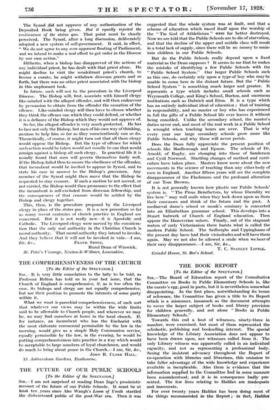THE FUTURE OF OUR PUBLIC SCHOOLS [To the Editor of
the SPECTATOR.)
am not surprised at reading Dean Inge's pessimistic account of the future of our Public Schools. It must be at least ten years since Alec Waugh's Loom of Youth startled the disheartened public of the post-War era. Then it was suggested that the whole system was at fault, and that a scheme of education which based itself upon the worship of the " Tin God of Athleticism " were far better destroyed. Now we are told that the Public Schools are to die of starvation, and that the decline of the upper and middle class will result in a total lack of supply, since there will be no money to main- tain children in our Public Schools.
But do the Public Schools really depend upon a fixed material as the Dean supposes ? It seems to me that he makes the mistake of identifying a few Public Schools with the " Public School System." Our larger Public Schools such as this one, do certainly rely upon a type of boy who may be unable to ..come here in the distant future. But the " Public School System " is something much larger and greater. It represents a type which includes small schools such as Weymouth College, and King's School, Burton, and enormous institutions such as Dulwich and Eton. It is a type which has an entirely individual ideal of education ; that of training in responsibility, and no master or boy who has experienced in full the gifts of a Public School life ever leaves it without being ennobled. Unlike the secondary school, the master's duties never end, and most of the real work in a Public School is wrought when teaching hours are over. That is why every year our large secondary schools grow more like Public Schools, and why these will never perish.
Does the Dean fully appreciate the present position of schools like Marlborough and Epsom. The schools of Dr. Arnold, of Rugby, are changing into those of Sanderson and Cyril Norwood. Startling changes of method and curri- culum have taken place. Masters know more about the new movements in the science of teaching than any other body of men in England. Another fifteen years will see the complete disappearance of the Flashmans and the profound alteration of our Tom Browns.
It is not generally known how plastic our Public Schools' system is. " The Pious Benefactors, by whose liberality we live here " may well smile when they look down upon us from their canvasses and think of the future and the past. A mediaeval dame's school or monk's seminary is converted into an Elizabethan grammar school. This develops into a Stuart bulwark of Church of England education. Then appear the Hanoverian ushers. Finally, out of the stagnant waters of early Victorianism there bursts what is called the modern Public School. The Sedberghs and Uppinghams of the present day have had their vicissitudes and will have them again. May we not also be allowed a smile when we hear of their easy disappearance.—I am, Sir, &c.,
T. C. STANLEY LITTLE.
Grindal House, St. Bee's School.






































 Previous page
Previous page